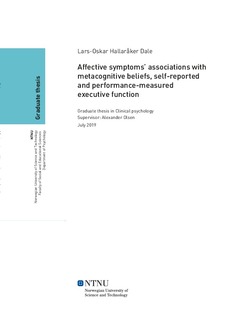Affective Symptoms' associations with metacognitive beliefs, self-reported and performance-measured executive function
Master thesis
Permanent lenke
http://hdl.handle.net/11250/2620357Utgivelsesdato
2019Metadata
Vis full innførselSamlinger
- Institutt for psykologi [3086]
Sammendrag
Executive control and metacognitive beliefs are viewed as key contributors to emotional distress and disorder in the theoretical basis for metacognitive therapy, the self-regulatory executive function model. The present study aimed to investigate relative, shared and interacting contributions of these to levels of affective symptoms in a non-clinical sample. The study is the first to include both a self- and performance measure of executive function together with assessments of metacognitive beliefs and affective symptoms. Data were collected from 59 subjects recruited mainly from the NTNU campus, who completed the self-report forms Metacognitions Questionnaire-30, the Behaviour Rating Inventory of Executive Function-Adult, the Hospital Anxiety & Depression Scale, and three rounds of the neuropsychological test Conners Continuous Performance Test 3. Analyses with hierarchical multiple regression supported a moderate associations between metacognitive beliefs and affective symptoms. Performance test variables and self-reported executive function were initially found to significantly account for variance in symptoms, but did not display unique contributions in the final model. One possible interpretation of these results in line the with self-regulatory executive function model is that metacognitive beliefs take precedence in the relationship between executive function and effective symptoms.
